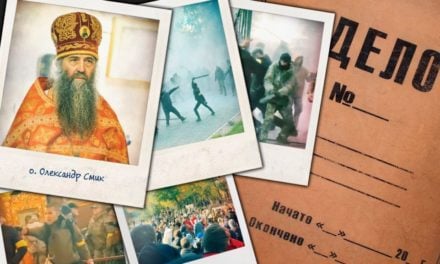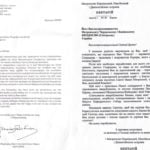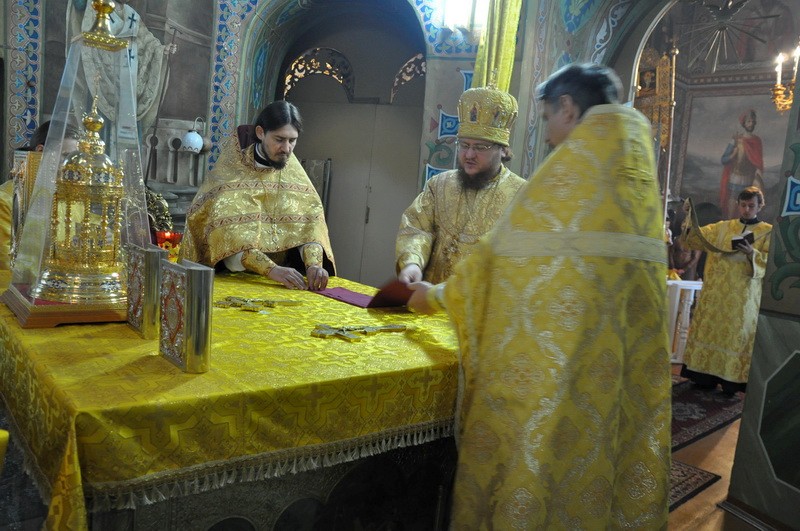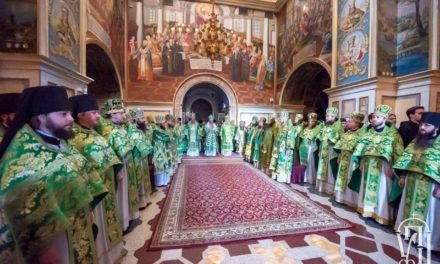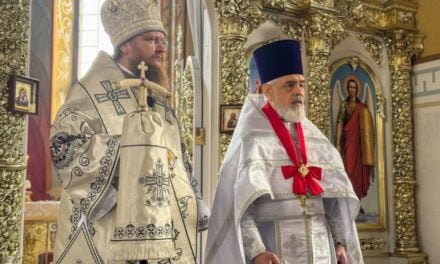
CORONAVIRUS: “THE CHURCH MUST BE PREPARED FOR LARGE-SCALE DISASTERS”
An interview with the Archbishop Feodosiy (Snigirov) of Boyarka.
Today, the entire media world is replete with the theme of coronavirus. As recent weeks have shown, this problem has become a subject of intense debate for the Church community. On this difficult topic, we present an interview conducted with Archbishop Feodosiy (Snigirov) of Boyarka—a Vicar of His Beatitude, Metropolitan Onuphry of Kiev and All Ukraine, and Administrator of the Northern Vicariate of the capital of Ukraine, Associate Professor of the Kiev Theological Academy, and Head of the Ecclesiastical Court of the Kiev Diocese.
—Vladyka, there is a heated debate in the Church community as to whether or not the sanitary requirements of secular authorities should be applied within the church? Can a virus be transmitted through Communion? What if we are required to close the churches? What do you have to say on these issues?
—The fact that the coronavirus has become a topic and catalyst for ecclesastical discussion is very good. The Church always needs to be prepared for external challenges and dangers, and times of calmness relaxes this. The coronavirus is a good occasion for our Orthodox Church to doctrinally prepare for the eschatological time [the end times.—Trans.] To prepare theologically, canonically, and also liturgically. So far, what is being voiced on this topic is, for the most part, conceptually raw and shortsighted.
—What do you have in mind by this?
—Two opposing positions are voiced, each of which is an extreme. Unreasonable extremes, it seems to me.
The first one is: Let’s unquestionably listen to all the epidemic instructions from the local authorities, close the churches, cancel Communion and other sacraments for a while, until the pandemic ends. Some Local Churches have already taken this path, and have undertaken the corresponding decisions.
And the second extreme is this: It can’t hurt believers, let’s not pay any attention to these horror stories, let’s keep frequently going to church, receiving Communion, and everything will be fine. And if we do get infected, then this is our fate.
I believe that both of those extremes are theologically imperfect and can be very dangerous for the Church—if not now, then in the future.
You see, the prince of this world, who is opposed to the Church of Christ in the name of the secular world, is constantly testing our strength, looking for weak places where he can make a chasm in the life of the Church. Now, with this coronavirus, he is also testing us. Maybe in a couple of months we will be laughing as we look back at this horror story, like we now recall the “bird” or “swine” flus. But what will be said and done by the Church now will have consequences in the theological, canonical, and liturgical sense for a very long time, and perhaps forever.
Without going into arguments about what the coronavirus is—the influence of technology [media panic or hysteria] or a real pandemic, we will only say that the doctrines the Church will develop today in connection with this situation will become either protection or immunity against more powerful and sophisticated attacks, which are to come upon the Church in the future; or they will become a “hull breach” in the Ark of the Church.
—How could that happen, what are the weaknesses of the positions commonly expressed by believers today?
—I’ll begin with the second extreme—“nothing will hurt us!” At the bare minimum, this sounds very self-confident and smells of spiritual prelest [delusion.—Trans.] Such self-confidence is born of the neophytism[1] of the holders of this position, from their ignorance of Church history and Orthodox asceticism, from the lack of experience of their weaknesses, including the weaknesses of their personal faith. They are sure that the Gospel words: They shall take up serpents; and if they drink any deadly thing, it shall not hurt them; (Mark 16:18), is directed personally at them, in their current spiritual condition.
Without going into the details of this discussion, I will only note that the clergy of the older generation, as well as lay people from “cradle born” Orthodox families, who have absorbed their religiosity from their grandfathers and great-grandfathers, do not have this Komsomol slogan—“nothing will harm us!” Although the older generation, by virtue of their faith and humility, probably really won’t be hurt by anything. And where is the line between “hurt” and “not hurt”? The Eucharistic Chalice—holy water—miraculous icons—simple icons—the church—the zapivka[2]—the priest’s blessing—candles, prosphora?
How can you determine the line at which you can get infected or not? And if you remember the statement of the Holy Synod, about the need to disinfect churches, and use disposable cups for the zapivka, then this means you can still get infected somewhere. Is there room for miracles? And where is the line between the miraculous and the ordinary? Personally, I think that there is certainly a place for a miracle, but a line still exists. Only this line cannot be so primitively defined, as we would like, and as would be convenient for us from a practical point of view: Here you go, you can’t get infected from the Chalice, but you could get it from the zapivka, and that’s why we had to switch to disposable cups. Everything is much more complicated here, and this is a task for the Synodical commissions and wise spiritual fathers. But this isn’t the matter at hand.
If, hypothetically, such a lovely hypothesis—“nothing can hurt us!”—were to be accepted as Church doctrine today, without any exceptions, it could become a powerful tool in the future for the devil to fight against the Church. Indeed, those who are confident in their righteousness, and in their right to a miracle, who reject the Divine gift of reason—it is very easy for the enemy to break such people both spiritually and bodily. The proud are resisted by God Himself, but He gives grace to the humble.[3] I think our readers themselves can easily think of possible scenarios in which opponents of the Church would be able to poison / infect / or desecrate entire communities of such proud, arrogant people. Unless, of course, the Lord does not have mercy on His foolish, self-confident children and sends the Great Martyr Theodore of Tyro to their rescue.
—On the other hand, what harm could come to the Church if it were to categorically, fully obey every instruction from the epidemiologists, as has already been done in a number of Churches?
—In that case, we would simply walk right into a trap, which will shut behind us. The Church Militant, in any case, by the time of the Antichrist, will find itself in this trap, when we are deprived of freedom in the celebration of the Liturgy, and in many other ways. But why bring ourselves closer to that on our own? If the Church adopts a “whatever they say, we’ll do,” stance as its doctrine of responding to social problems, then in the near future, authorities in different countries will be able to close our churches, and deprive the faithful of the Liturgy under any humanitarian pretext—a pandemic, the danger of nuclear war, climate change, etc. Believers in Ukraine, and now in Montenegro, have recently understood very well how modern politics, without changing their humanitarian trappings, can try to ruin and destroy multimillion-strong church communities, using their leverage. This does not add optimism to the situation. And we need to be ready today for the realities of the Church in such conditions. To blindly follow the lead of those in power will result in separation.
—And so, what’s the way out? What theological and canonical foundations for the Church is it necessary to establish as solutions for these humanitarian issues, in order to protect ourselves from these future problems?
—Our Church has already begun the work. The statement of the Holy Synod of the Russian Orthodox Church in connection with the epidemic, as well as the local diocesan encyclicals of the hierarchs of our Church in connection with the coronavirus, firmly and unequivocally lead the flock from a one-sided understanding, and therefore, a one-sided solution to the problem. I think that relevant Church commissions should still work very well and quickly on this to find the necessary mechanisms for protecting the Church, and the necessary words for explaining these mechanisms to believers.
I will voice my point of view, which, perhaps, in some part, may turn out to be imperfect or erroneous, after the final church resolutions, this will become clear. It seems to me that, on the one hand, it is necessary to develop an intra-ecclesiastical concept of informational protection of the flock from all kinds of false viruses, as well as the machinations of modern geopolitics. At the same time, it is necessary to take into account the uncertainty of the real epidemic situation, when such technologies will be used in the future, and therefore, the actual sanitary protection for faithful when visiting churches should be ready for “quick deployment”.
And on the other hand, we must always be prepared to fulfill the Gospel commandment:
And ye shall hear of wars and rumours of wars: see that ye be not troubled: for all these things must come to pass, but the end is not yet. For nation shall rise against nation, and kingdom against kingdom: and there shall be famines, and pestilences, and earthquakes, in diverse places. All these are the beginning of sorrows[4] (Matt. 24; 6–8).
This means that it is necessary to develop and possess a liturgical concept of the life of the Church, should suddenly society really does encounter a deadly infection, or contamination of territories with poisons, or radiation, without the possibility of evacuation. This is not a fantasy or someone’s horror stories. This is the apocalyptic reality of the future. When the Church will encounter this reality, no one knows but God. But echoes of it, so to say, “rehearsals”, are happening now. For example, the coronavirus. And the Church today must be ready for the possibility of large-scale disasters and real pandemics.
What is an alternative to public worship? What is the measure of permissible disinfection (decontamination, etc.) of holy items? Is there an alternative to communion in church during a total pandemic? Perhaps, in such exceptional situations, it will be blessed for the Reserved Gifts to be administered to the laity, and they could receive communion at home—as was the case in the ancient Church? In this case, it is necessary to determine who is a real “layman” and who is not. Should there be fixed lists of parishioners? Disposable Vessels for the Reserved Sacrament? Remote confessions? All these are questions that, I am sure, will sooner or later be confronted by our Holy Orthodox Church. May God grant that it be as far off in time as possible. But we need to prepare for their answers now.
[1] A neophyte is someone newly initiated into a tradition, especially in Christianity, not having been seasoned with long years of experience in church life. This can be the newly baptized or “overzealous” converts, or likewise “cradle-born” Orthodox people who have only recently become seriously “churched” or devoted later in life.
[2] A drink or more accurately post-communion wash made from hot water and wine, given to communicants after having communed in the Slavic tradition along with antidoron. This does not exist in the Greek tradition.
[3] James 4:6
[4] In the Russian synodical translation, this can read also “the beginning of diseases…” or “sicknesses”.
Количество просмотров: 123
Цей запис також доступний на: Russian


